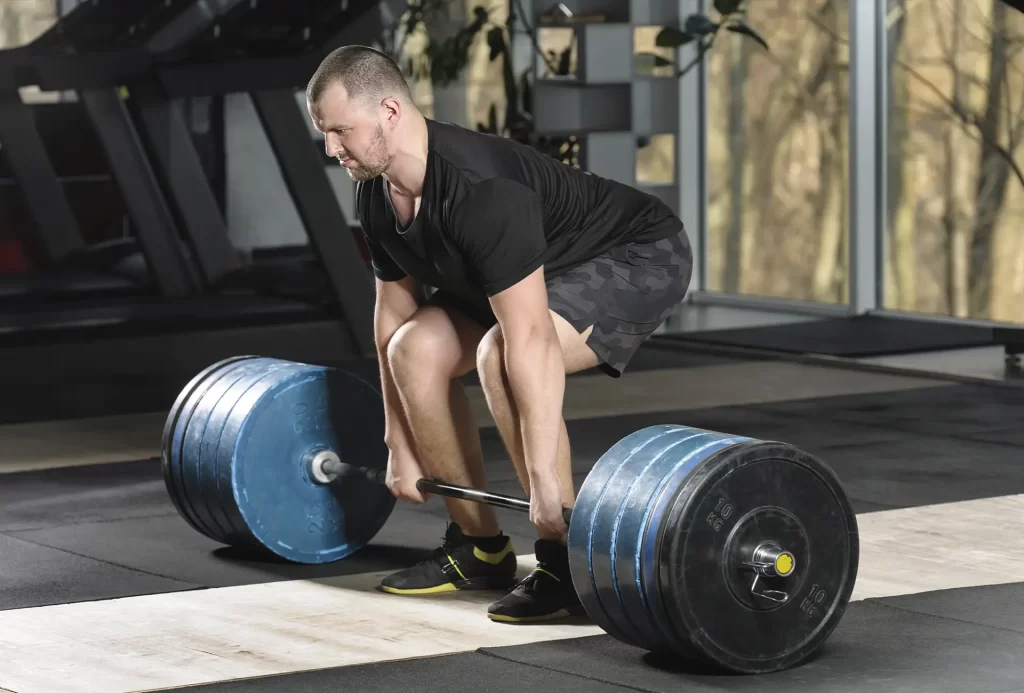Have you ever thought about how to improve your performance node training? The baking soda may be the solution. It helps improve performance in intense training. Many high-level athletes use it.
Studies show that the baking soda can increase the concentration of bicarbonate ions. This raises the pH of the blood. This helps to slow down the muscle fatigue and improves the performance in activities lasting from 30 seconds to 12 minutes. But how exactly does it work?
Understand how the baking soda works is essential. It should be consumed in the right dose, from 300 mg to 500 mg per kilo. This helps to obtain the best results and avoid side effects.
What is Baking Soda and How Does It Relate to Exercise?
Sodium bicarbonate is a chemical substance made of sodium, hydrogen, carbon and oxygen. Its chemical composition It acts as a buffer, helping to keep the blood pH balanced. It neutralizes acidity in the body, which is essential for exercising well.
Your function in the body is vital, especially in exercises strong. It helps to delay the muscle fatigue and improves the performance sports. This happens because baking soda keeps the blood pH ideal, allowing the muscles to work better.

Sodium bicarbonate has also been used in sports for a long time. It is known to improve performance and reduce muscle fatigue. Research shows that taking baking soda can improve performance during intense activities. But the exact percentage of improvement is not known.
| Benefit | Description |
|---|---|
| Delays muscle fatigue | Helps regulate the blood pH, allowing muscles to work more efficiently |
| Improves sports performance | Helps to increase the resistance muscle and improve performance in exercises intense |
Benefits of Baking Soda During Workout
Sodium bicarbonate improves the performance in activities that require muscular effort. Studies show that it increases performance in sprints and Wingate tests.
Using baking soda helps to reduce muscle fatigue. It also improves resistance physical. It is useful for recovering muscles after training.
You studies show that sodium bicarbonate is more effective for those who already train. The recommended dose is 0.3 g/kg of NaHCO3. Ideally, it should be consumed 60 to 90 minutes before training.

Below is a table with studies that show the benefits of sodium bicarbonate:
| Study | Modality | Dosage | Result |
|---|---|---|---|
| Study 1 | Sprints | 0.3 g/kg | Performance improvement |
| Study 2 | Wingate Test | 0.3 g/kg | Improvement in resistance physical |
| Study 3 | Cycling | 0.2 g/kg | Performance improvement |
In conclusion, sodium bicarbonate improves the performance in activities of high intensity. Your benefits include less muscle fatigue and more physical endurance during training.
Mechanisms of Action in Physical Performance
Sodium bicarbonate is essential for physical performance. It helps maintain the blood pH at an optimal level. This allows athletes to make intense efforts without tiring quickly.
Studies show that sodium bicarbonate improves physical endurance. It helps remove hydrogen ions from muscles. This decreases acidosis and muscle fatigue.
In addition, sodium bicarbonate regulates the blood pH. This is crucial for energy production during exercise. It plays an important role in this process.
To take advantage of the benefits of sodium bicarbonate, it is important to know how to consume it. dosage recommended is 0.2 to 0.3 g/kg of body weight. The consumption should be done 60 to 90 minutes before exercise.
It is essential to combine baking soda with a balanced diet and proper training. As mentioned in foods to slim your waist, one combination of nutrients and supplements improves physical performance.
Regulation of Blood pH
The regulation of blood pH is crucial for physical performance. Baking soda helps maintain blood pH stable. This allows athletes to make intense efforts without tiring quickly.
How to Use Baking Soda Before Training
To get the most out of baking soda node training, it is essential to know how to use it. supplementation with baking soda should be done 60 to 90 minutes before the training. This gives the body time to absorb and use the substance during activity.
Some important points to consider when using baking soda before the training include:
- THE dosage recommended is 0.2 to 0.3 grams of baking soda per kilogram of body weight.
- The powder form of baking soda may cause gastrointestinal discomfort, while gastrointestinal capsules may reduce this effect.
- THE use of baking soda can improve performance in various sports, especially high intensity.
In short, the baking soda can be a valuable tool for athletes looking to improve their performance during training. However, it is essential to follow the instructions of dosage and use to avoid side effects and ensure the effectiveness of the supplement.
| Sports Modality | Benefits of Baking Soda |
|---|---|
| Swimming | Improved speed and endurance |
| Cycling | Increased power and reduced fatigue |
| Race | Improved endurance and reduced muscle fatigue |
Recommended Dosage and Consumption Timing
To take advantage of the benefits of sodium bicarbonate in the training, it is essential to know the dosage and the timing of consumption. Studies show that the dosage The ideal amount is 0.2 to 0.5 grams per kilogram of weight. For someone weighing 70 kg, this means consuming between 14 and 35 grams.
The best time to take baking soda is 60 to 90 minutes before exercise. You can take it in powder or capsule form. To learn more about baking soda in training, visit websites specialized in sports nutrition.
THE dosage and the timing of consumption can vary from person to person. Therefore, it is best to speak to a health professional or sports nutritionist. They can help you find the dosage and the timing perfect for you.
Side Effects and Contraindications
It is essential to know the side effects and the contraindications of baking soda before using it. Studies show that nausea, vomiting, and abdominal pain affect about 30% of users. Baking soda can also cause discomforts such as bloating, gas, and abdominal pain.
Those with kidney or liver disease should be careful. It is crucial to speak to a doctor before using baking soda. A consultation with a healthcare professional helps you know if it's safe for you.
The side effects and contraindications of sodium bicarbonate include:
- Nausea and vomiting
- Abdominal pain
- Gastrointestinal discomfort
- Kidney or liver disease
In short, it is important to know the side effects and contraindications of sodium bicarbonate. This ensures a use safe and effective. Always talk to a doctor before starting to use baking soda, especially if you have any medical conditions.
Best Types of Exercises to Use Baking Soda
To get the most out of baking soda, it's essential to know which ones exercises are more effective. According to research, it works best in high intensity exercises and that last a short time. This includes strength training and resistance.
Examples of high intensity exercises who benefit from bicarbonate are:
- Strength training, such as squats and bench presses
- Trainings of resistance, such as running and cycling
- Exercises of CrossFit
Baking soda can increase the resistance muscle. This is especially true for activities lasting 1 to 7 minutes.
Additionally, research shows that bicarbonate improves performance in races. resistance. This applies to activities such as rowing and running.
| Exercise Type | Duration | Benefits of Baking Soda |
|---|---|---|
| Strength training | Short duration | Increase in resistance muscular |
| Trainings of resistance | 1-7 minutes | Performance improvement |
Combination with Other Supplements
Combining baking soda with other supplements can improve sports performance. synergy among these supplements can intensify the benefits of sodium bicarbonate.
Supplements that combine well with baking soda include:
- Beta-alanine: increases muscle endurance and reduces fatigue.
- Creatine: improves strength and muscle mass.
It is crucial to avoid combinations that may cause side effects or interact negatively with baking soda. combination The ideal amount of supplements depends on the type of exercise and the athlete's goal.
Studies indicate that mixing sodium bicarbonate with other supplements may be beneficial for athletes. high intensity. However, it is essential to consult a health professional before starting any supplementation.
Scientific Studies and Evidence
You studies scientific show that sodium bicarbonate can increase physical performance. This increase ranges from 2-3% to 10-15%, depending on the exercise. evidence indicate that the greatest benefits are in high-intensity activities.
You scientific also found that sodium bicarbonate is safe and well tolerated. However, it is crucial to follow the dosage instructions. Using sodium bicarbonate chronically can lead to high doses that are not effective in the long term.
Here are some important facts about the supplementation with baking soda:
- Recommended dosage: 0.2 to 0.5 g/kg body weight
- Average age of participants: between 20 and 30 years old
- Total number of studies analyzed: 5 studies
- Studies that have shown a positive effect of supplementation of NaHCO3: 3 studies
In short, the studies scientific and the evidence show that sodium bicarbonate can improve physical performance. But it is essential to use the supplement correctly and consult a professional before starting.
| Study | Dosage | Result |
|---|---|---|
| Study 1 | 0.3 g/kg | Performance improvement |
| Study 2 | 0.5 g/kg | There was no improvement |
| Study 3 | 0.2 g/kg | Performance improvement |
Conclusion
Studies show that the baking soda helps athletes improve their performance. This is because it helps delay muscle fatigue. It is most effective in short, intense workouts like HIIT and soccer.
To use the baking soda correctly, follow the dosage instructions. The recommended dosage is 300 to 500 mg per kilogram of weight. The amount of 300 mg/kg is the safest to avoid problems.
Before you start using the baking soda, talk to a doctor. This is important for your safety. With a balanced diet and proper training, baking soda can be very useful.


